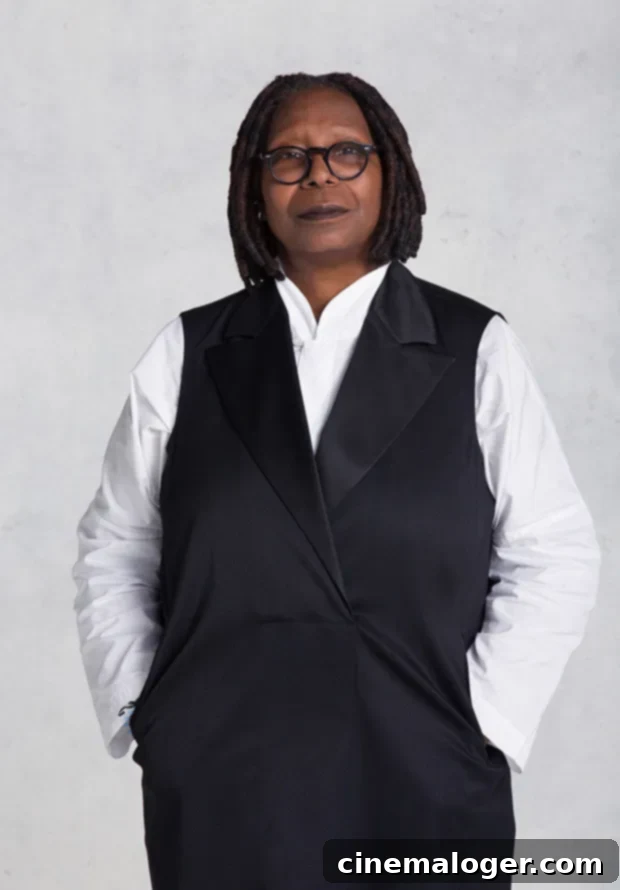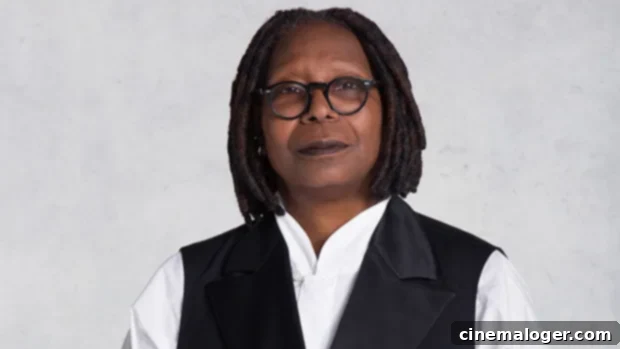Whoopi Goldberg Demands Urgent Gun Control Reform After Nashville School Shooting: A Call for Policy and Change
In the somber wake of the tragic school shooting at The Covenant School in Nashville, Tennessee, which claimed the lives of three children and three adults, legendary entertainer and co-host of The View, Whoopi Goldberg, delivered a passionate and unequivocal plea for immediate and stringent gun safety legislation. Her powerful message, delivered during a Tuesday, March 28 episode, resonated deeply, signaling a fervent demand for action over mere rhetoric.
Goldberg’s stance was visually underscored by her attire: a sweater boldly emblazoned with “Thoughts and Prayers” crossed out, and underneath, the resolute declaration, “Policy and Change.” This sartorial statement encapsulated the growing frustration among many Americans who believe that platitudes and condolences, while well-intentioned, fall woefully short in addressing the epidemic of gun violence. She specifically called for stronger regulations governing the types of firearms individuals can own, along with comprehensive records detailing weapon ownership, arguing that such measures are not compromises but fundamental necessities for public safety.
SIX KILLED IN NASHVILLE SCHOOL SHOOTING: After a private Christian elementary school in Tennessee’s capital city became the site of the latest school shooting massacre, which claimed the lives of three children and three adults, #TheView co-hosts react. https://t.co/cVclFZQmjA pic.twitter.com/4Wy7YWmgoC
— The View (@TheView) March 28, 2023
Beyond “Thoughts and Prayers”: The Urgency of Policy and Change
The call for “Policy and Change” reflects a significant shift in public discourse surrounding gun violence. For years, following mass shootings, the phrase “thoughts and prayers” has become a ubiquitous, albeit often criticized, response. While expressing sympathy is vital, Goldberg articulated the sentiment of many who feel that such expressions have become a substitute for meaningful legislative action. The Nashville tragedy, like countless others before it, highlighted the urgent need for concrete policy changes that can genuinely prevent future fatalities.
Goldberg’s powerful message underscored the idea that real change requires tangible efforts, not just emotional responses. This includes re-evaluating existing gun laws, closing loopholes, and implementing new regulations that prioritize the safety of communities, especially schools and public spaces. Her emphasis on moving beyond rhetorical comfort towards practical solutions resonates with a populace increasingly weary of tragic headlines and the perceived inaction of lawmakers.
The Driver’s License Analogy: Accountability for Gun Ownership
The debate on gun control often involves complex arguments about individual rights versus collective safety. As conservative co-host Alyssa Farah Griffin began discussing potential policy adjustments – such as enhanced training requirements, universal background checks, and comprehensive mental health screenings to make the acquisition of deadly assault weapons like the AR-15 more challenging – Whoopi Goldberg interjected with palpable frustration. “Why are we compromising?” Whoopi asserted, her voice charged with emotion. “I am tired of trying to find a way to justify you being able to keep 75 guns in your house. I am tired of trying to figure out a way to say: listen, we have rules and regulations.”
Goldberg drew a compelling parallel between gun ownership and the requirements for obtaining a driver’s license, a comparison often used by gun safety advocates. She argued that just as society mandates licenses, tests, and registration for operating a vehicle, similar stringent requirements should apply to owning firearms. “When will it go far enough? When are people going to figure out that just as you were saying: I have to have a license to drive. It’s not a compromise. We don’t discuss it. You either get a license, or you go to jail,” she explained. “So to me, you want to have 7011 guns? We need to know that. We need to know what you got, because you are now being painted with the same swath as all the people who are killing people left and right with legal guns.” This analogy highlights a core demand for accountability: if firearms are powerful tools with the potential for immense harm, then their ownership should be subject to rigorous tracking and oversight to ensure public safety.

The Assault Weapons Debate: Utility vs. Danger
A central point of contention in the gun control debate, and one that Whoopi Goldberg passionately addressed, is the availability of assault weapons. She specifically called out the ownership of such firearms, emphasizing their lack of practical utility in “normal, daily life” compared to other types of guns. Referencing the federal ban on assault weapons that was in effect from 1994 to 2004, Goldberg argued, “I don’t have a tank. I can’t go and buy a tank. AR-15’s have no use in normal, daily life. None.” This statement underscores the argument that weapons designed for military combat have no place in civilian hands and contribute disproportionately to the lethality of mass shootings.
Assault weapons, characterized by features that facilitate rapid firing and tactical use, are often at the center of discussions about gun violence. Proponents of bans argue that these weapons, like the AR-15, are designed for maximum harm in a short amount of time, making them exceptionally dangerous in civilian contexts. Reinstating such a ban is a primary goal for many gun safety advocates, who believe that removing these high-capacity, rapid-fire firearms from public circulation would significantly reduce casualties in mass casualty events.
The Need for Records and Awareness, Not Confiscation
Whoopi Goldberg clarified that her advocacy for stricter gun laws is not about disarming all gun owners or confiscating every firearm. Instead, her focus is on transparency, accountability, and public safety through comprehensive record-keeping. “I don’t say give up all your guns. I don’t know why you have to have 5011 of them, but maybe you do, but I want to know that you’ve got them, because I want to make sure that I’m aware of what’s going on in my periphery, and if you’re not willing to do that, then we all have a problem,” she articulated. This nuanced position aims to strike a balance between respecting responsible gun ownership and implementing measures to prevent firearms from falling into the wrong hands or being used irresponsibly.
The call for records and registration aligns with the idea of a responsible society managing potentially dangerous items. Much like cars, certain chemicals, or even pets, there are societal expectations for knowing who owns what, especially when there’s a risk to public safety. This “awareness” allows law enforcement to better track firearms, investigate crimes, and potentially intervene before tragedies occur. It’s a mechanism for ensuring that the right to bear arms is exercised responsibly, without endangering others.
Protecting the Children: A Moral Imperative
Before concluding the poignant segment, Goldberg powerfully appealed to the collective conscience, urging everyone to consider the profound and devastating impact of lax gun policies on children. She dismissed the notion that simply deploying armed guards in schools is a sufficient or effective solution. “Telling people to put armed guards in schools doesn’t work. Talk about Uvalde if you’re not sure how that went down. Talk about what kids are dealing with. These are our kids. They may not be your kids, but they’re my kids. They’re your kids. They’re somebody’s kids,” Whoopi passionately stated. Her words served as a stark reminder that the consequences of inaction are borne by the most vulnerable members of society, children who deserve to feel safe in their learning environments.
The tragic events at Robb Elementary in Uvalde, Texas, where armed police officers were present but failed to immediately neutralize the shooter, serve as a harrowing example of why armed guards alone are not a panacea. This reality underscores the argument that a multi-faceted approach, starting with preventing dangerous weapons from reaching individuals who would misuse them, is far more effective. Goldberg’s powerful closing statement reiterated that the protection of children transcends political divides; it is a fundamental responsibility that society owes to its future generations.
Whoopi Goldberg: A Consistent Voice for Gun Safety Reform
Whoopi Goldberg has long been an unwavering advocate for robust gun safety measures, consistently using her prominent platform on The View to champion reform. Her impassioned plea following the Nashville shooting is not an isolated incident but part of a sustained commitment to addressing gun violence. Her consistent voice serves as a powerful reminder of the ongoing struggle for meaningful change.
Her past advocacy further solidifies her position. After the Supreme Court’s controversial decision in June 2022 to strike down a New York law that required individuals to demonstrate “proper cause” for carrying a concealed weapon, Goldberg condemned the ruling as a “middle finger to New York.” At the time, she articulated the confusion and danger inherent in such rulings: “We have been trying to figure out how to get a handle on all that has been going on in this city in particular with gun laws, and it makes you wonder: what does this mean? Are we saying to people, ‘Yes, you can come to this city and conceal your weapon’? And now the police have to figure out who’s carrying and who’s not and who’s legal to carry? It’s insane,” she lamented. Her sustained commitment to this issue highlights the broad societal implications of gun laws and the profound responsibility of lawmakers to prioritize public safety.
Whoopi Goldberg’s persistent efforts on The View and her willingness to challenge the status quo underscore the critical importance of public figures using their influence to advocate for change. Her message after the Nashville shooting was clear: the time for incremental discussions is over; the time for decisive policy and impactful change is now.
